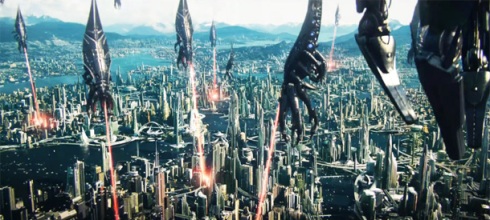This is the last week of posts on the Mass Effect Trilogy. All this week we’re breaking down the epic finale in Mass Effect 3. This is perhaps the closest a review on this site has been written to the release of a game, so expect serious SPOILERS. This first post on Mass Effect 3 will look at the bumbling supporting character Conrad Verner and his relationship with Commander Shepard.
Commander Shepard has a fan club, his name is Conrad Verner. There are many possible branching options in regard to this character, but for the sake of this post I will follow my experience in which I made Paragon choices and he was in all three games. Conrad’s story can be both a warning and an example for us.
The Warning
Hero worship is a very common concept for humanity. As long as there have been might warriors or inspiring leaders, there have been less-intelligent lackeys who will follow close behind. We all need heroes, as Aunt May so aptly points out, and this is the very reason why Cerberus resurrected Shepard in ME:2. The galaxy could only unite if there was a common hero that everyone would follow.
But there is a danger to putting any other human on a pedestal. Role models and mentors are great, but lifting someone up to the level of worshiping them, as Conrad Verner does, will lead to ruin. This level of hero worship is played out in many ways in our culture. Just think of Bieber Fever, the guy who’s car is covered in Obama stickers, the sports lover who has 14 versions of their favorite player’s jersey, any George Lucas/Star Wars fan before the prequel trilogy…and the list could go on.
The Christian thinker John Calvin said that the human heart is an idol factory. This means that if there’s something that we think is even remotely worth worshiping, we will do so to the extreme. For Conrad Verner, this was his downfall since his desire to emulate Shepard led to his gruesome death by bus accident in one possible outcome, or his involvement with Cerberus in ME:3. He caught wind that Shepard did it, so he did it too, only to find out that Cerberus was bad.

"I heard that you had jumped off a cliff and I was gonna do that, but then I heard you joined Cerberus so I did that instead."
Worship is not bad, but the object of your worship is important. Commander Shepard could be a worthy person to emulate, but Conrad mindlessly worshiped him and caused harm to himself and others. If you’re going to worship someone or something, make it be something that is perfect, unchanging, and lasting.
The Example
For all of Conrad’s buffoonery and mistakes, his character is masterfully redeemed in one possible outcome in ME:3. While he has joined Cerberus with their shady business, he has also made something of himself by obtaining a doctoral degree in xenoscience. Suddenly, Conrad has a little something to offer the galaxy.
In my playthrough, there’s this incredible scene where Shepard has a list of things he needs and Conrad just happens to have the corresponding information that Shepard is missing. It’s as if all of Conrad’s lifes’s work has led to this point where he interacts with Shepard and Shepard is able to use that towards the building of the Crucible. He has spent his entire life producing what amounts to be a few small things in the grand scheme of the saving of the galaxy. These bits of information only add a few points to the all-important Effective Military Strength bar. But Shepard is indeed able to use the information, despite it’s relative insignificance. That information is used to help the most important project for the survival of the galaxy.
There’s a popular story in the Bible of Jesus using a few fish and loaves to feed thousands of people, with enough food miraculously appearing for there to be leftovers. One minor detail in this story is that the original small amount of food was provided by a little boy. It was probably his lunch or the contents of a small grocery trip which Jesus took and made into a feast for what would otherwise have probably been a music festival.
The dynamic between Conrad and Shepard is reminiscent of how we relate to God. We have but little to offer the all-powerful God of the universe with our poor mortal efforts. In fact, God doesn’t even need us at all, but he chooses to use us anyway, just so we’ll be included. Like that boy, we only have a small contribution to offer. But that contribution placed in God’s hands can be multiplied exponentially through his power and for his purpose.
One thing Conrad Verner did get right was that he made his life’s purpose revolve around a person. When we do this, our time and energy and skills go towards the worship and advancement of that person. We must consider what will become of our contributions and what all of our sacrifices are going towards. Many of us will be like Conrad Verner and worship a person, but we must choose that person carefully.
Questions:
Who inspires you? Who do you worship?
What small contributions have you made to something that brought about more than you expected?
We’ll continue to look at the greater war effort in Mass Effect 3’s story in the next post.

